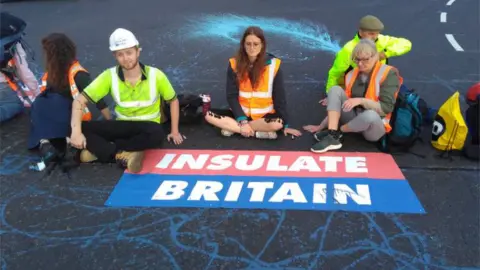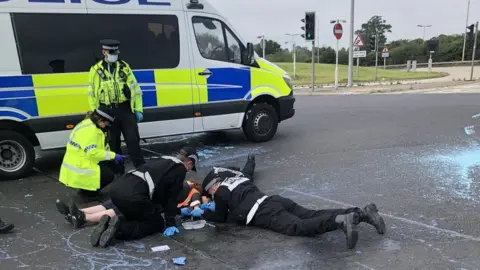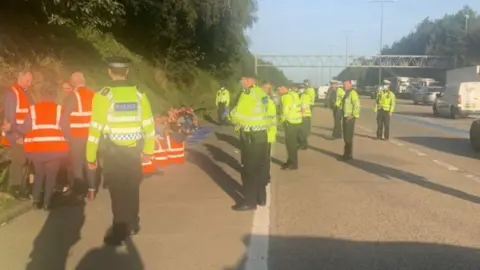Insulate Britain: Injunction granted against M25 protesters
 Insulate Britain
Insulate BritainA court ruling won by the government warns climate change protesters that they could be jailed if they continue their campaign of blocking the M25.
Ministers hope the High Court injunction can prevent further disruption around London.
Insulate Britain has blocked parts of the M25 five times in the last fortnight.
Transport Secretary Grant Shapps tweeted that activists faced "possible imprisonment if they flout".
The Department for Transport (DfT) said more than 200 Insulate Britain campaigners had been arrested at the protests, the first of which affected Essex, Hertfordshire and Kent on 13 September.
Protesters have also targeted other motorways, including the M11 near Stansted Airport in Essex and the M3 in Surrey.
The civil court action was taken by National Highways - the government body which runs motorways.

The protest group has been calling for the installation of heat-saving measures in social housing by 2025, and all homes by 2030.
Insulate Britain spokeswoman Zoe Cohen told BBC Radio 4's Today programme that protesters "understand the risks they are taking are because we have tried everything else to make the government protect us from the predicted impacts of climate chaos".
"That involves the loss of all that we cherish, our society, our way of life and law and order," she said.
In a reply to Mr Shapps' tweet, Insulate Britain said the government "is reckless and is putting lives at risk with its inaction on #insulation".
Mr Shapps told MPs he believed the injunction would bring an end to the demonstrations.
"It barely goes without saying, it's irresponsible, dangerous and completely counterproductive," he said.
"Earlier in the process there was a somewhat different approach being taken.
"Yesterday the police were on the scene much more quickly. The injunction will greatly strengthen their hand."
Allow X content?
Home Secretary Priti Patel, who last week described protesters' actions as "selfish", said the injunction would mean "people can get moving again" on the London orbital motorway.
"We will not tolerate lives being put at risk," she said.
 PA / Insulate Britain
PA / Insulate BritainMr Shapps added the government would be reviewing the powers, but it was "unacceptable for people to be able to walk on to not just a major highway but a motorway, stop traffic, be released the next day and do the same thing again".
"An injunction may just be an interim way of doing [stopping] that," he said.
 Surrey Police
Surrey PoliceAssistant Chief Constable for Humberside Police, Chris Noble, who is the National Police Chiefs' Council lead for policing protests, told the Today programme police "aren't anti-protest but we are pro-responsibility".
"This is not a benign supermarket car park that this is taking place on," he said.
He said police officers were most likely to come to harm as a result of the protests because they were having to run across motorways to try to remove the campaigners.
In his High Court order, Mr Justice Lavender ruled it should last until 21 March, but there would be a hearing to review the situation on 5 October.
The order covers every part of the M25 and the Dartford Crossing, including slip roads and bridges, and states that demonstrators are banned from "causing damage to the surface of or to any apparatus on or around the M25 including but not limited to painting, damaging by fire, or affixing any item or structure thereto".
The order means that breaching it could lead to a civil court hearing.
In a statement, Insulate Britain said it would continue its protests and "as soon as the government makes a meaningful statement that we can trust, we will leave the motorway".
During the recent protests, the government said it was "investing £1.3bn this year alone to support people to install energy efficiency measures, and our upcoming Heat and Buildings Strategy will set out how we decarbonise the nation's homes in a way that is fair, practical and affordable".

Find BBC News: East of England on Facebook, Instagram and Twitter. If you have a story suggestion email [email protected]
